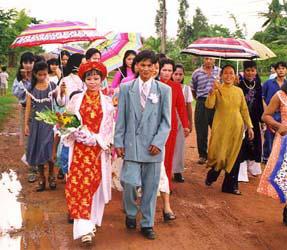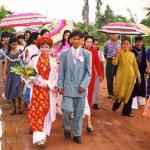Wedding in the Countryside
It's 7:30 in the morning and my friend, Huong, and I are slumped in the back seat of a taxi on our way to her cousin's wedding. You have to love Vietnam. Where else can you ask an old family friend if you can "borrow" his taxi for a two-hour trek into the countryside? Huong's mother, Thu, and six-year-old half-sister, Mimi, are sitting in the front passenger seat. Mr. Minh, the old family friend, is driving.
Huong and I have known each other for almost three years. We met not long after I moved to Saigon, in the English-language video shop where she used to work. We lunch on chicken soup at least once a week in our favorite dive behind Ben Thanh Market. We lounge in my neighborhood beauty salon for fifty-cent pedicures every Thursday night. And we swim on Saturdays in the pool on the roof of the Rex Hotel. Today's jaunt to her birthplace of Tan Hiep is the first time we've taken a holiday together.
Morning traffic in Saigon is a snarl of cars, trucks, motorcycles, bicycles, cyclos and a variety of makeshift vehicles that sound as if they were invented in lawn mower factories. We creep through the city, adding an hour to our trip just to reach the highway that leads south into the delta. Industry and mildewed cement-block buildings mar emerald patches of rice. Exhaust spews from obsolete DeSoto trucks.
Tan Hiep does not boast distinguishing landmarks and I take it on faith--with great relief--when Huong announces that we've arrived. Mr. Minh's taxi was not designed for foreign legs. We swing right off the grimy highway. Thatch replaces cement. Rice fields billow undeterred. Mr. Minh stops the car beside a path just wide enough for two people to walk abreast.
Huong and I race beneath low branches. Shadows dapple the red earth. Palm trees separate half a dozen, tidy single-room huts. Their walls are made of plaited grass. Huong hasn't lived here since she was two, but she visits often. Proprietarily, she charges through the family property. Children swarm after us but Huong bursts my delusions of self-importance by informing me that the kids mob her when she comes alone, because she is a city girl.
A tiny old woman whisks out of the tiniest of the tiny huts. Her hair is swept back into a bun. She wears a sheer purple blouse and black trousers. I've already seen her high, round cheekbones on Thu's face and her quick smile in Huong's expression. I have been instructed to call Huong's grandmother Ba, which is a variation of 'aunt' used for older women. Ba reminds me of my eighty-seven year old Gram, who laughingly calls herself "The Little Dwarf."
Relatives abound, preparing for the wedding, and Huong attempts to prune her family tree into manageability for my understanding. But I come from an enormous extended family. My Gram boasts five generations alive today: over seventy offspring, not including in-laws or step-kids. At family picnics we older cousins no longer bother to learn the names of the constantly replenished stock of infants. It's no problem keeping track of Huong's kin.
The cabin in the center of the property belongs to Thu's older sister, Ma Hai. Ma Hai means Second Mother and even her peers use this affectionate nickname. Ma Hai's husband was killed during the war. One of his friends was jealous of his position in the army and shot him while he was fishing. Huong tells me that Ma Hai is courted regularly, but her four children don't want her to remarry. These gentle, usually bashful young adults intimidate unsuspecting suitors by lurking in the back of the house moaning eerily and playing with knives.
Ma Hai is the mother of the groom, Anh Ba. It is traditional for families in Vietnam to identify their children by birth order, although this custom is complicated by superstition. A first son, for example, is called Anh Hai, although the name literally means "second son." Beginning with number two is an attempt to dupe jealous spirits who might want to abduct a first child. Anh Ba, whose name translates into "third son," is actually Ma Hai's second son. It's a handy numbering system, once you get the hang of it.
Huong's aunts and uncles are extremely poor like so many in rural Vietnam. They subsist on money from weaving market baskets. The wedding reception will take place in the dirt courtyard in front of Ma Hai's house. But nature donates elegance. Swags of wild grass adorn timber beams, and guests will enter through an exotic arbor made of water palm fronds.
A crew of uncles and male neighbors, who have staggered over from a nearby funeral ceremony, has gathered for an early celebration. An empty bottle of rice wine languishes in the middle of their table. It is quickly replenished and when Huong and I pass by we are challenged to drink. A scorched stomach lining is not worth the cheers our sips elicit. Politely, but firmly, we decline to "tram phan tram"--to drink one hundred percent.
We are making our escape when bedlam resounds down the lane that borders the side of the property. Branches crack and bare feet pound the hard earth. Two uncles who have obviously had their fill of rice wine come running, weaving one behind the other, through the trees. They are balancing a pole between them.
Tied to this pole, hanging by its feet, is an enormous hog. The men laugh raucously as they parade around the huts. The hog looks stupefied. I am asked if I want to bring my camera and capture the slaughter. No thank you. Am I being overly squeamish, or would Huong's family find my aunt's "Macaroni Casserole with Corn Flake Topping"--a staple at all our family occasions--as revolting as I find the thought of that poor pig at the reception tomorrow?
After lunch and a lazy nap in Ba's hammock while waiting for the noon heat to vanish, Anh Thu ("third brother") is charged with squiring Huong and me to Tan Hiep's single attraction, a government-owned pineapple farm four kilometers away. We hop onto bicycles and pedal down the wide dirt road. Three hours later we return drenched from this pitiful tour, our legs coated with mud. 'Tis the season for afternoon downpours.
The time has come to prepare for tonight's festivities. There is a brief concerned discussion about my need to take a shower. The shower is a primitive, outdoor, thatch-walled stall. I persuade everyone that I am perfectly comfortable with these facilities. Then, having sauntered off and secured myself inside the cubicle, I discover that crudeness was not their concern. It was the height of the roof. I crouch and stoop and am grateful the water is lukewarm because it is no easy feat to scrub myself down in a shower made for leprechauns. (Photo 9: The shower)
Huong and I elbow through the crowded cooking area on the side of Ma Hai's house. The skinned head of the hog hangs from the rafters. The rest of the beast has been chopped up for spring rolls, salad and soup. Huong is just as repulsed as I am and we flee to the front porch where we find Anh Ba earnestly arranging roses and jasmine for his bride's bouquet. Huong and I are so charmed by this intimate gesture that we sit in a corner watching until the bouquet is finished.
Bachelor parties are unknown here except among the civilized ex-pat community. Instead, a Vietnamese groom spends his "last night of freedom" hosting a dinner for his family and friends. It's like a rehearsal dinner, without the rehearsal, without the bride, and not limited to members of the wedding party. It is also his chance to express appreciation.
The porch overlooks the courtyard. The gang of rice wine drinkers has expanded. Men arrive on Honda motorcycles and jostle for seats at one of the tables. The women are either cooking or circled on the hard bed in Ba's house, gossiping. Eight young ladies arrive. They are friends of Ma Hai's youngest child: beautiful, wonderfully gentle, seventeen-year-old Hang. Their blouses are crisp and demure. They seize a table on the porch where they can observe the festivities from afar.
Off to one side a man has set up a stereo system for the evening's main event: dancing and karaoke. Surrealism sweeps the courtyard. Drunken uncles watch clusters of young men dance to Abba on a packed-earth dance floor beneath rustling palms. Teenage boys dancing together is not taboo in Vietnam, and tonight in particular it's matter of limited options. The girls on the porch are shy to the point of paralysis.
I find this situation intriguing. In the west, everyone is expected to flirt at weddings, unless of course they're already part of a couple, and then they're expected to fall in love all over again. If you go to a wedding and don't experience a fleeting crush on someone, a groomsman or third cousin of the bride perhaps, there is something wrong. It doesn't matter that you would never glance at that person on the street. Flirtation is mandatory. But this party is experiencing a serious case of emotional segregation.
I am begged more than once to take the microphone and belt out my favorite tune. I'm willing to publicly humiliate myself in most ways, but I refuse, absolutely refuse, to sing. As an English teacher, I was a grave disappointment to my students during the persistent blackouts that plagued our school. Blackouts that lasted longer than twenty minutes were torture. Students pleaded for songs, I refused, and from other classrooms we heard the off-key screeching of teachers far more obliging that myself.
I try to feign shyness, as if I am one of the sweet-faced girls around me. Nobody buys it. I negotiate for my freedom by agreeing to dance to a disco ditty I've never before heard. I'm usually an uninhibited dancer, but I find myself intimidated by my twenty adolescent dance partners and an audience of forty rice wine-impaired men. As soon as the song is over I race back to the female section of the party.
But the women's table is no haven. Where am I from? How old am I? Am I married? What do I do for a living? Where do my parents live? Do I have brothers and sisters? I had forgotten how exhausting incessant small talk could be, particularly in a second language.
The unruly reverberation of the bass concusses my thoughts. Huong looks equally frazzled. What happened to our bucolic family holiday? I want to suggest escape, if only for ten minutes, but I don't want to be rude. Even Ba is sticking it out, tapping her toes as if Chinese Techno is her favorite musical choice. When Huong leans over and asks if I want to go for walk, it's an effort to stifle my joy.
The distance from the party to the road is about a kilometer, but the open countryside is an effective amplifier. The wailing serenade of drunken wedding guests hounds us. We search for a pocket of silence and a place to sit. We fail. Drizzle accompanied most of the evening, and the ground is wet.
We do not speak as we wander. We have reached a stage of sisterhood in our friendship where we can spend time together without the need to pad it with conversation. The hamlet at the crossroads to the pineapple farm shut down hours ago. Stars converge in the sky ahead of us. This filmy thicket is an anomaly in the otherwise black, empty sky. Huong is carrying a small flashlight, but the darkness becomes impenetrable. We turn back. It's almost eleven. We will try to sleep.
Because I am a guest, and especially because I am a western guest, Huong and I have been assigned a "proper" bed in a "proper" bedroom in an uncle's cement-walled house. An aunt brings pillows that could easily be used as doorstops. She tucks the mosquito net around the mattress and opens the window. Huong and I flop back onto the bed and start laughing. Our solid little pillows may as well be wired directly into the stereo.
I toss and turn and fall into fitful sleep. At midnight Huong crawls over me. "I'm going to have some soup," she tells me, as if this is a perfectly normal thing to do at this time of night. Perhaps it's just a way to assuage her sleeplessness. The music has degenerated to drunken, off-key shrieking, but it's still going strong, with no sign of wrapping up soon. Maybe bachelor parties aren't such a bad thing after all. At least they keep the drunks isolated from their loved ones.
Around three, I bolt upright roused by a sound far more deafening than the music-- total silence. But I'm too exhausted to enjoy it. I collapse almost immediately into unconsciousness.
My luxurious sleep lasts two hours. Saigon may be marching rapidly into the capitalistic age, but exasperating remnants of Communism linger in the countryside. Loudspeakers sprout from poles planted in groves of palms, and each morning, from five to five-thirty, local police stations broadcast patriotic symphonies and propagandistic news.
Huong's families' loudspeaker happens to be directly above our open window. I groan and look at Huong. But her eyes are closed and her smile is serene. Like my own sister back home, she can sleep through a herd of elephants stampeding through a hurricane. As I shuffle through the pre-dawn to the outdoor bathroom, I discover that I am the only person in the entire compound disturbed by the harangue.
At 8:30, when I duck into Ba's hut to change for the wedding, I'm sluggish. I can hear the children gathering impatiently outside. They are dressed in their best clothing, waiting for me to bring out my camera.
Huong's relatives don't own a camera, Huong's camera is broken, and although a photographer has been hired to chronicle the ceremony, funding limits him to shooting a single roll. Special occasions with my family involve at least two dozen Canon Sure-Shots snapping away at all times, so I am not the least bit jealous of the attention my camera has received since we arrived. I only wish I'd brought more than three measly rolls of thirty-six exposures.
One by one, children pose in front of a tall, neatly pruned jade tree. Then, four great aunts request a photograph. Huong wants a shot of her grandfather's remaining siblings. An old man asks shyly if I will take a picture for his family to display on his altar after he passes away.
I begin to worry. I'm running through film faster than my subjects are running out of enthusiasm, and I want to take some photos of the actual wedding ceremony, as a way of repaying the unbridled hospitality I've been shown. Fortunately, Huong and I are summoned to join the wedding party.
Vietnamese weddings are far more participatory than traditional western weddings. Loved ones do not wait passively in a church for the bride and groom to perform vows. Instead, the groom's entourage, consisting of chosen family and friends, parades through the village to the bride's house, where the actual ceremony takes place. After the ceremony, everyone from both parties returns to the groom's for the reception. Here the groom's relatives serve a meal to the bride's relatives as a way of saying, "Welcome to the family."
Huong and I traipse behind the small wedding procession, up the road we walked in darkness last night. Damp red earth coats our shoes. Women carry umbrellas to protect themselves from the sun. Ma Hai's traditional, purple velvet gown clings discretely to her slender body. Ba's dusky purple outfit would be equally elegant were it not for her plastic Hot Wave thongs. Anh Ba, in the lead, looks like a young boy waiting to grow into his first suit.
Fields of new rice shimmer. Field workers glance up from beneath conical hats. People come out onto their porches to examine us. I know that I'm the reason for some of the attention, but it's impossible for me to be inconspicuous. I'm almost a foot taller than everyone else in the party. A water buffalo swings its head to ogle our march into the lane leading to the bride's house.
Oddly, Anh Ba's brothers and sister do not attend the actual ceremony. They are back home, preparing for the reception. In fact, no one but the elders seems to care about the vows at all. Huong and I are seated at a table on a porch with a group of women who nibble cookies, sip tea, swat flies and gossip through the entire ceremony. Considering how momentous a wedding service is in the west, I feel guilty that I have no idea what is going on inside.
What are the bride and groom saying to one another? What are they saying to their parents? What are they drinking out of those tiny cups? What's on those little pillows they're holding? I ask Huong, and in her marvelously nonchalant way, she shrugs, assuring me that I'm missing nothing too interesting.
Suddenly, I am ushered back into the lane, where the groom and his crew have reconvened. The bride, her nine sisters and the rest of her party join us. The sun blazes. A rainbow of umbrellas canopies our parade back to the reception.
The reception, too, is unlike any in the west. There is no music or dancing--all that was taken care of last night--and there is no cake. It is basically a very large meal, fortified by hog meat, where the bride and groom drift from table to table, receiving toasts to their happy future. The most familiar aspect is the gaggle of nosy women at my table, asking me how experienced I am in love and when I plan to get married.
Toward the end of lunch, Huong and I sneak away to Ba's hammocks. But we are unable to maintain privacy. A drunk uncle stumbles around the corner and suddenly notices my "high nose." It reminds him of the American GI's who served in the war. Huong refuses to translate his rapid outburst, but I hear the words Viet Cong.
The subject of the war has hovered on the cusp of our entire trip. One of Huong's great uncles lost an arm and his sight to a mine. Another uncle questioned me at lunch the first day about the effects of chemicals on the rising rate of disease in Vietnam, a subject of particular concern because his sister is a victim of breast cancer. Most of Huong's male relatives served during the war. But no one has made it an issue until now.
Huong's silence indicates not embarrassment, but indignation. She is a very protective friend. But I know her uncle's tirade has nothing to do with me or the war. It's motivated solely by the copious guzzling of rice wine. I promise Huong that drunk, obnoxious uncles are a fixture at most American weddings. To make her feel better, I offer to take her to a reception in America where she will surely be insulted--or propositioned, which is often the same thing--by the time the champagne is finished.
We are scheduled to return to Saigon at one o'clock this afternoon and we prepare to leave at noon. I am hugged and petted. Last photos are requested as a way of prolonging our departure. Huong and I may be ready to get back to the peacefulness of our lives in Saigon (how is it possible that we now consider Saigon peaceful?), but we are not ready to say good-bye. Family is family, and they may drive us crazy, but we love them.
Mr. Minh left yesterday; he had to get his taxi back, so we round up a pair of motorcycles to take us to the highway. Thu and Mimi ride with a neighbor. Huong, beautiful Hang, two large satchels and me teeter over the rutted road on Hang's frail Honda. We wait on the side of the highway until a battered bus careens in our direction. Thu flags it down, and although it never fully stops, we manage to climb on board. Our wreck shrieks into traffic. The driver honks viciously and cuts off a sleek air-conditioned bus filled with western tourists gazing serenely out tinted windows. A group tour from the delta. They probably took hot showers this morning. They probably smell wonderful. They are probably refreshed. I tuck my legs into the minuscule space in front of my seat. Huong has already fallen asleep on my shoulder. A chicken squawks from the roof.
I am tired, I am dirty, but I'm not envious. Those tourists may have just had the biggest adventure of their lives, eating snake soup and paddling through rice paddies, but adventures are a dime a dozen in this day and age. I have had something better. So far from my own country and from my own family, I have just been allowed the luxury, if only for a few days, of going home.
 ThingsAsian
ThingsAsian



















